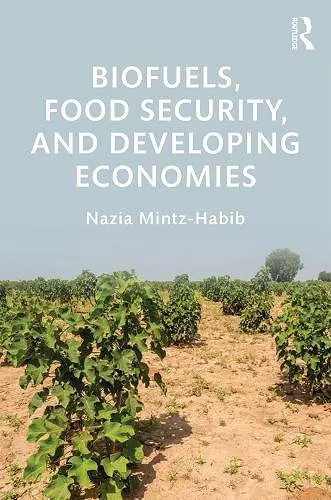Biofuels, Food Security, and Developing Economies
Exploring the Intersection of Energy and Food Security
Format:Hardback
Publisher:Taylor & Francis Ltd
Published:7th Jan '16
Currently unavailable, and unfortunately no date known when it will be back
This hardback is available in another edition too:
- Paperback£45.99was £45.99(9781138588912)

This insightful exploration delves into the complexities of biofuels and their impact on food security in developing economies, particularly through case studies and innovative approaches.
This book investigates the relationship between biofuels feedstocks and the national food security strategies, agro-export orientation, and rural development policies in developing economies. In recent years, the world has faced significant challenges regarding both food and energy security. The development of biofuels, particularly through the cultivation of energy crops, has emerged as a potential solution to these challenges. However, as Biofuels, Food Security, and Developing Economies reveals, this shift can lead to a diversion of agricultural land from food production to energy crops, raising concerns about food security, especially in less developed nations.
The author provides a comprehensive analysis of how biofuels feedstocks align with the goals of national food security and rural development. Through detailed case studies from Tanzania and Borneo, the book examines the non-edible crop jatropha as a means to find a balance between food production and energy needs. The author introduces an innovative method called the Institutional Feasibility Study, which serves as a foundation for her analysis, addressing the complexities of integrating biofuels into existing agricultural frameworks.
Key questions are explored, including how global initiatives for sustainable development influence the biofuels industry and whether biofuels trade offers viable investment opportunities for developing countries. The book also discusses the implications of commitments from the EU and the US on the rapid growth of the biofuels sector in these regions, as well as the broader impacts on poverty reduction and agricultural modernization. Overall, Biofuels, Food Security, and Developing Economies presents a nuanced view of the biofuels landscape and its implications for developing nations.
"Nazia Mintz-Habib's fascinating study explores how, and in what circumstances, biofuel crops contribute to either perpetuating or alleviating poverty and food insecurity by considering the complex interactions among agricultural commodity and energy markets, climate change mitigation finance and farming communities." – Jomo Kwame Sundaram, Coordinator for Economic and Social Development, Food and Agriculture Organization of the United Nations.
"This book provides a highly original application of the Institutional Feasibility framework to the analysis of developing countries' role within global value chains in primary commodities. It makes a valuable contribution to public policy and development studies." – Peter Nolan, Chong Hua Professor and Director, Centre of Development Studies, University of Cambridge, UK.
ISBN: 9780415729703
Dimensions: unknown
Weight: 498g
220 pages